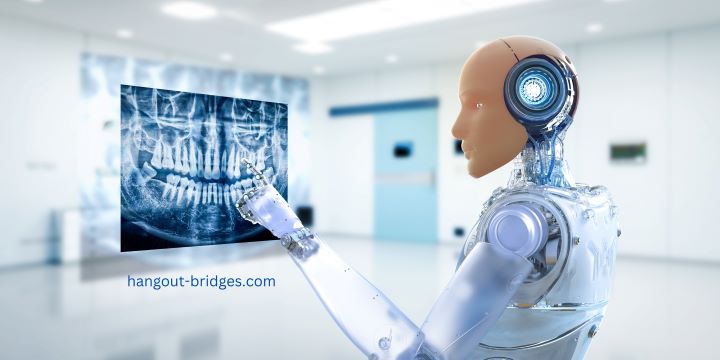Discover the forefront of healthcare innovation as we delve into the groundbreaking advancements in Artificial Intelligence transforming patient care. From personalized treatment plans to predictive diagnostics, explore how AI is revolutionizing the landscape of healthcare, offering new hope and possibilities for improved outcomes.
Introduction to AI Innovations in Healthcare
Healthcare is just one of the industries that artificial intelligence (AI) is starting to change. Artificial intelligence in healthcare revolutionizes patient care by providing more accurate diagnoses, personalized treatment plans, and efficient administrative processes. The scope of AI in healthcare is vast, encompassing everything from diagnostic tools to robotic surgeries, predictive analytics, and virtual health assistants. These technologies are fundamentally reshaping healthcare delivery, aiming to improve patient outcomes and streamline operations.
AI-Powered Diagnostics
AI has advanced medical diagnoses significantly, especially in radiography and pathology. With never-before-seen accuracy, AI systems can evaluate medical pictures from MRIs, CT scans, and X-rays. These technologies have proven especially adept at identifying early signs of diseases like cancer, often detecting abnormalities that human eyes might miss. According to a Medical News Today article, several hospitals have already implemented AI diagnostic tools, resulting in faster and more accurate diagnoses.
Moreover, AI is also being used to interpret genomic data, helping to identify genetic mutations associated with various diseases. This capability enables healthcare providers to offer more personalized care, targeting treatments that are most likely to be effective for individual patients. AI’s quickness and precision in diagnosis not only enhance patient outcomes but also lighten medical practitioners’ workloads, freeing them up to concentrate on more difficult cases.
Personalized Medicine
One of the most groundbreaking applications of AI in healthcare is its role in personalized medicine. By analyzing a patient’s genetic information, lifestyle factors, and medical history, AI can tailor treatment plans specifically for that individual. This individualized strategy lowers the chance of unfavorable side effects and raises the possibility that treatment will be successful. According to Healthcare IT News, AI-driven treatment plans have already shown promise in improving patient outcomes.
Personalized medicine, powered by AI, is especially transformative in oncology. AI algorithms can predict how different cancer treatments will perform for individual patients based on their unique genetic makeup. This allows oncologists to choose the most effective treatment plan from the start, reducing the trial-and-error approach that has traditionally been part of cancer treatment. Delivering targeted therapy ensures that patients receive optimal care, leading to better survival rates and quality of life.
Robotic-Assisted Surgeries
Robotic-assisted surgeries are another area where AI is making a significant impact. Artificial intelligence (AI)-enabled surgical robots can carry out difficult operations with more control, flexibility, and precision than human surgeons. These robots are designed to assist in minimally invasive surgeries, reducing recovery times and minimizing complications.
The use of AI in surgery isn’t limited to robotics. AI can also assist surgeons by providing real-time data during procedures, such as highlighting critical structures and suggesting optimal surgical paths. This support allows surgeons to make more informed decisions, leading to improved surgical outcomes. The application of AI in surgery is anticipated to grow as these technologies develop further, providing even more sophisticated capabilities and better patient outcomes.
Virtual Health Assistants
Virtual health assistants powered by AI are revolutionizing the way patients interact with healthcare providers. These digital assistants can provide health information, schedule appointments, and offer reminders for medication and follow-up visits. They can also answer basic medical questions, helping patients manage their health conditions more effectively.
For instance, virtual nurses and chatbots are being used to provide preliminary medical advice and triage patients based on their symptoms. Concentrating on more urgent situations enables medical professionals to shorten wait times and raise patient satisfaction. Virtual health assistants are particularly beneficial for managing chronic diseases, where continuous monitoring and timely intervention are crucial. These AI-powered technologies help patients adhere to their treatment programs and enhance their general health results by offering continuous support and guidance.
Predictive Analytics
One more potent use of AI in healthcare is predictive analytics. Through the analysis of past data and pattern recognition, AI algorithms are able to forecast future health occurrences and outcomes. With the potential to avert significant health conditions and improve patient outcomes, this skill enables healthcare providers to intervene early.
For example, predictive analytics can be used to identify patients at high risk for chronic conditions such as diabetes or heart disease. By proactively addressing these risks, healthcare providers can implement preventive measures and create personalized care plans to mitigate potential health problems. Predictive analytics is also used in hospital settings to predict patient admissions, optimize resource allocation, and improve operational efficiency. As AI continues to advance, the potential for predictive analytics to transform healthcare delivery and patient care will only grow.
Accelerated Drug Discovery
The process of drug discovery and development is notoriously time-consuming and expensive. AI has the ability to completely transform this procedure by speeding up the identification of viable therapeutic candidates and streamlining clinical trials. Large volumes of data, including scholarly publications, clinical trial findings, and molecular structures, can be analyzed by AI algorithms to find compounds that show promise for additional research.
AI-driven drug discovery has already led to the identification of new potential treatments for various diseases, including cancer and Alzheimer’s disease. By streamlining the research and development process, AI can bring new drugs to market faster, potentially saving lives and reducing healthcare costs. Furthermore, AI can help design more efficient and targeted clinical trials, increasing the likelihood of success and reducing the time and resources required for drug development.
Remote Patient Monitoring
Another area where AI is having a big impact is remote patient monitoring. AI is now able to continuously monitor patients’ vital signs and health indicators in real time thanks to the development of wearable technology and smart home technologies. By analyzing this data, healthcare professionals can be informed to take action before circumstances get worse and to spot early warning indicators of possible health problems.
This feature is especially helpful for individuals who suffer from long-term illnesses like diabetes, heart disease, and respiratory problems. AI-powered remote patient monitoring enhances patients’ quality of life by offering ongoing observation and prompt interventions to help manage chronic conditions more successfully. Furthermore, patients can receive care from the comfort of their homes with remote monitoring, which lessens the demand on healthcare facilities and eliminates the need for frequent hospital trips.
In conclusion, AI innovations are revolutionizing patient care in numerous ways, from enhancing diagnostics and personalized medicine to improving surgical precision and streamlining administrative tasks. As AI technologies continue to advance, their impact on healthcare delivery will only grow, leading to better patient outcomes, increased efficiency, and more accessible care. AI will be crucial in creating a more efficient and fair healthcare system that benefits all people. Thus, the future of healthcare looks bright.









